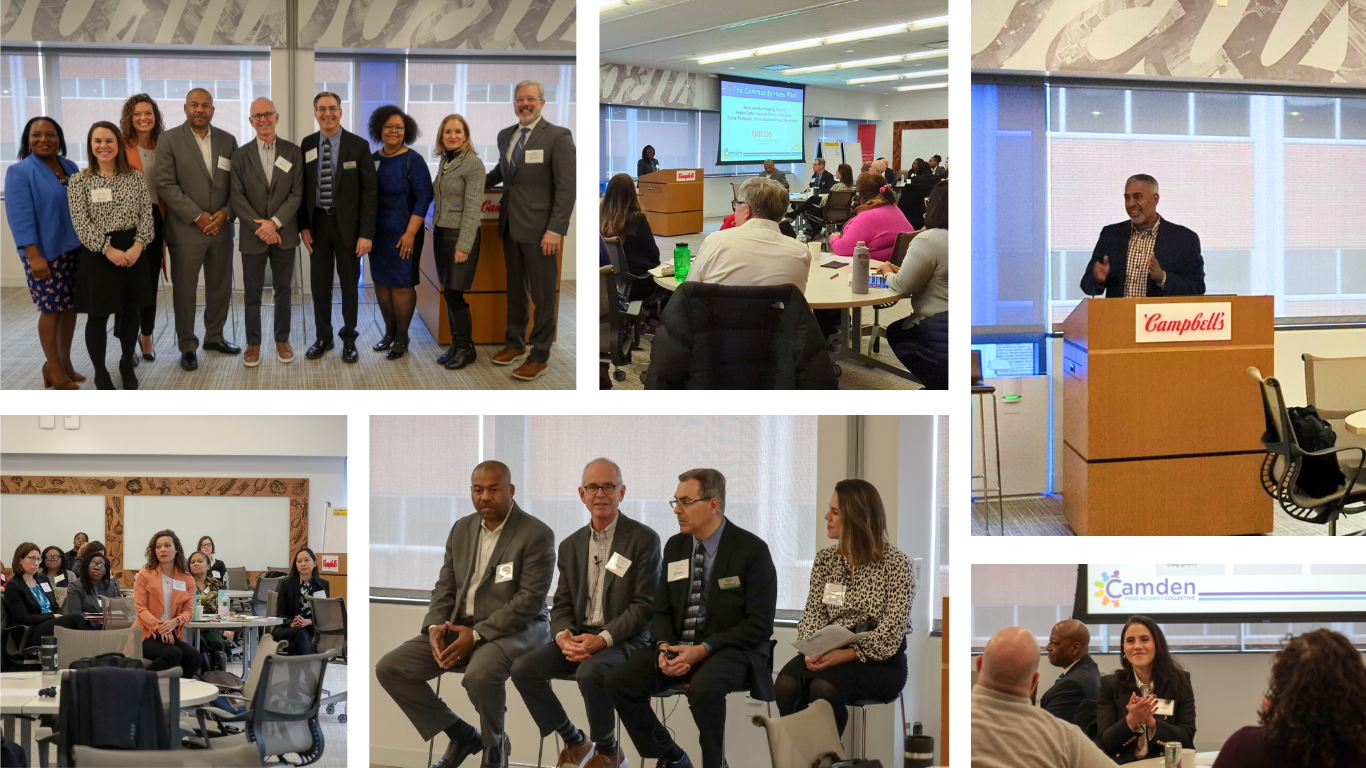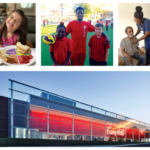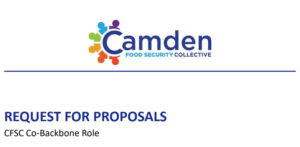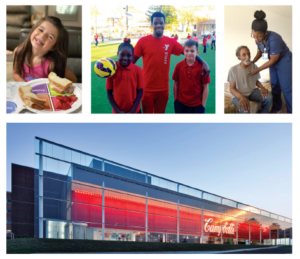
Camden Food Security Collective Convenes Local Champions Combating Food Insecurity
“We really love collaboration, and love when organizations collaborate with other organizations to help tackle an issue.”
Those remarks from Robert Juliano VP, Director of Corporate Giving, WSFS Cares Foundation were just one of similar sentiments expressed at a Funders Convening of the Camden Food Security Collective hosted by Campbell’s at their headquarters in Camden on January 31, 2024.
The event included about 65 Collective partners, supporters, funders, and local officials, such as Camden City Mayor Victor Carstarphen; Assemblyman Bill Spearman; Commissioner Virginia Betteridge; Commissioner Jeff Nash; Dalin Hackley, representing Congressman Donald Norcross; and MacKenzie Belling, representing Senator Cory Booker.
In addition to learning more about the Collective, from its history stemming from Campbell’s Healthy Communities Initiative and its priorities moving into the future, those in attendance heard from the Collective’s research partners, the Senator Walter Rand Institute for Public Affairs, and four funding partners, The Campbells’ Foundation, Holman Enterprises, PSEG Foundation, and WSFS Foundation. The WRI team reported on key findings from the community Hubs pilot program, while the funders discussed the reasons their organizations signed on to help the Collective make meaningful change in the communities they serve.
The Collective – Working Together Toward a Common Agenda
According to Whitney Buchmann, CFSC Consultant with Illustra Impact, the Camden Food Security Collective is currently made up of 36 organizations and six community residents. This group of cross-sector stakeholders – from the school district to large healthcare systems, from the Food Bank of South Jersey to a multinational corporation – work toward a common vision of increasing food security and equity in the City of Camden by 2031.
And, most importantly, centering community in that work.
“This work is not without challenges,” stated Lavinia Awosanya, Chief Development Officer for the Food Bank of South Jersey, the Collective’s backbone organization. “There were days when our path was not always clear or as certain as we would have liked it to be. However, the ONE thing we were always sure of, is that this work is worth doing. It deserves our attention, it deserves our commitment, and it certainly deserves our investment.”
Buchmann shared the Collective’s Common Agenda, which outlines strategic areas that will be addressed for Camden to successfully move forward toward a food-secure future:
- Co-location of community services. By listening to residents, CFSC knows that accessibility and trust are key components to ensure that residents are able to access, receive, and utilize an array of health and social services.
- Increasing residents’ financial security through employment, benefits, and housing.
- Improving access to nutritious food and the coordination of supplemental food.
WRI and the Hubs Pilot
To address all three of those areas, the Collective and its partners launched the pilot of several community Hubs in 2023. The aim of this undertaking was to co-locate varying social, health, and other services within the Camden community in order to deliver immediate mediations to individuals in need. But, to understand the impact of the community Hubs pilot, the Collective turned to its research partners, the Senator Walter Rand Institute for Public Affairs.
The Institute’s work is crucial in centering the community’s voice, understanding how residents are impacted, and using that information to co-create interventions that will get the Collective one step closer to its goal of a food-secure community.
The partnership with WRI was founded to support data- and research-driven decision making, agenda setting, and prioritization. So, the WRI team shared its research findings on the short-term community Hubs pilot, sharing opportunities for future consideration, strengths, successes, and lessons learned, all of which will allow the Collective team to move toward next steps, as well as the use and implementation of a shared measurement tool.
2024 Goals and Beyond
With this information in mind, members from the Food Bank of South Jersey followed WRI by discussing goals for the Collective for the coming year. In addition to building capacity within the Collective’s infrastructure, Rose Gaano, Senior Manager of Food Equity, and Sarah Geiger, Director of Programs and Services, discussed the need to create and implement shared quantitative and qualitative metrics of impact and success, and how the group will identify at least one project that aligns with all three pillars at upcoming meetings.
Aligning with the Collective Vision – Funders Panel
To create real change takes a lot of collaboration and support. The morning wrapped with a funders panel led by Kate Barrett President, The Campbell’s Foundation, and included Calvin Ledford, Jr. President, PSEG Foundation; Juliano from WSFS Cares Foundation; and Steve Holman Corporate Grants Director, Holman Enterprises.
“The funding partners who gathered to speak to the group exemplify genuine, trust-based philanthropy,” said Awosanya. “These types of funding partnerships lay the foundation for nonprofits to make meaningful policy, systems and environmental change in the communities they serve.”
The key takeaways from these funders was that the collaborative nature of the Collective’s programs are very attractive to organizations who are looking to support collective action and what can be achieved in working together.
“This program collaborates with the residents, the state, local level, plus among all the corporations and foundations,” said Juliano. “I firmly believe that with working as a group collectively and collaboratively that this program will be very successful. And, one day, there won’t be a food insecurity issue.”
WSFS Cares Foundation’s three-year commitment enabled us to award our first grant to support the Hubs pilot. And Holman Enterprises’ multiple year award has funded the research and evaluation work led by the Senator Walter Rand Institute for Public Affairs.
“At Holman, we’re trying to think about ways that we can be more impactful with our giving, and this aligned with that trying to be more thoughtful,” said Holman. “We kind of took a leap of faith, and it was it was hard for us, but hearing what we’ve heard today, I think our optimism was well-founded.”
“We (Campbell’s) do a mix of different types of funding, and we realize that supporting more systemic initiatives is not always going to lead to quick, measurable outcomes,” said Barrett. “This work can be very complicated, but we’re investing in the future and trying to make change that will, hopefully, outlive all of us.”
The Campbell’s Foundation’s seed funding has supported vital Collective’s infrastructure work, and funding from PSEG Foundation has also supported the backbone and the costs associated with standing up the Collective.
“The fact that this program isn’t just about feeding someone’s family for that day, in that hour, and that the program has a holistic view,” said Ledford. “The program is about considering wraparound service. The program is about understanding data-driven decision making.”
“We (PSEG) want to help individuals who may be a part of the working poor to be on a positive trajectory out of that position. We believe really strongly in the Camden Food Security Collective.”





